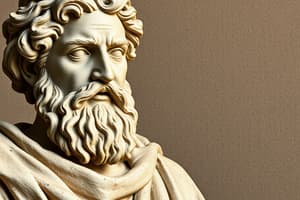Podcast
Questions and Answers
According to Aristotle, what is the primary purpose of a state?
According to Aristotle, what is the primary purpose of a state?
- To maintain a powerful military force
- To ensure the good of its citizens (correct)
- To increase the wealth of the rulers
- To expand its territory through conquest
Aristotle considered polity the best form of state.
Aristotle considered polity the best form of state.
False (B)
What are the two main categories into which Aristotle first classifies states based on their purpose?
What are the two main categories into which Aristotle first classifies states based on their purpose?
pure state and perverted state
According to Aristotle, a state originates as a ______ in its cycle.
According to Aristotle, a state originates as a ______ in its cycle.
Which of the following describes a 'pure state' according to Aristotle?
Which of the following describes a 'pure state' according to Aristotle?
Aristotle believed that the state is an ordinary community with no specific goals.
Aristotle believed that the state is an ordinary community with no specific goals.
Match the type of state with the description according to Aristotle:
Match the type of state with the description according to Aristotle:
According to Aristotle, What does a perverted state do?
According to Aristotle, What does a perverted state do?
According to Aristotle, what is the primary factor used to classify states?
According to Aristotle, what is the primary factor used to classify states?
Aristotle considered democracy to be the best form of government.
Aristotle considered democracy to be the best form of government.
What, according to Aristotle, is the pure form of a state ruled by a single person?
What, according to Aristotle, is the pure form of a state ruled by a single person?
According to Aristotle, when a monarchy becomes corrupt, it transforms into a ______.
According to Aristotle, when a monarchy becomes corrupt, it transforms into a ______.
Match the form of government with its description according to Aristotle:
Match the form of government with its description according to Aristotle:
What is the main characteristic of a 'pure state' according to Aristotle?
What is the main characteristic of a 'pure state' according to Aristotle?
Aristotle believed that the king in a monarchy should have absolute authority.
Aristotle believed that the king in a monarchy should have absolute authority.
What is the perverted form of aristocracy, according to Aristotle?
What is the perverted form of aristocracy, according to Aristotle?
According to Aristotle, a polity degenerates into a ______ when the ruling class becomes selfish.
According to Aristotle, a polity degenerates into a ______ when the ruling class becomes selfish.
Match the following terms to their description based on Aristotle's cycle of state:
Match the following terms to their description based on Aristotle's cycle of state:
According to Aristotle's cycle of state, what typically follows the degeneration of a polity?
According to Aristotle's cycle of state, what typically follows the degeneration of a polity?
Aristotle's classification of states encompasses all forms of modern governments.
Aristotle's classification of states encompasses all forms of modern governments.
According to Aristotle, what class primarily rules in a polity?
According to Aristotle, what class primarily rules in a polity?
In Aristotle's view, a perverted state is one where rulers are primarily driven by ______.
In Aristotle's view, a perverted state is one where rulers are primarily driven by ______.
Match the state form to its description based on Aristotle's classification:
Match the state form to its description based on Aristotle's classification:
Flashcards
Aristotle's Concept of State
Aristotle's Concept of State
Aristotle's idea of the state as the most fulfilling form of human association, existing for the betterment of its citizens.
Aristotle's Principles of State Classification
Aristotle's Principles of State Classification
Aristotle classified states based on their purpose (good or bad) and the number of rulers.
Pure State (Aristotle)
Pure State (Aristotle)
A state that prioritizes the well-being of its citizens and aims for the common good.
Perverted State (Aristotle)
Perverted State (Aristotle)
Signup and view all the flashcards
Monarchy (Aristotle)
Monarchy (Aristotle)
Signup and view all the flashcards
Aristocracy (Aristotle)
Aristocracy (Aristotle)
Signup and view all the flashcards
Polity (Aristotle)
Polity (Aristotle)
Signup and view all the flashcards
Aristotle's Cycle of State
Aristotle's Cycle of State
Signup and view all the flashcards
Aristotle's Classification of States
Aristotle's Classification of States
Signup and view all the flashcards
Monarchy
Monarchy
Signup and view all the flashcards
Aristocracy
Aristocracy
Signup and view all the flashcards
Polity
Polity
Signup and view all the flashcards
Tyranny
Tyranny
Signup and view all the flashcards
Oligarchy
Oligarchy
Signup and view all the flashcards
Democracy (as a perverted form)
Democracy (as a perverted form)
Signup and view all the flashcards
Purpose of the State
Purpose of the State
Signup and view all the flashcards
Pure State
Pure State
Signup and view all the flashcards
Perverted State
Perverted State
Signup and view all the flashcards
Number of Rulers
Number of Rulers
Signup and view all the flashcards
Aristotle's Ideal State
Aristotle's Ideal State
Signup and view all the flashcards
Limitations of Aristotle's Classification
Limitations of Aristotle's Classification
Signup and view all the flashcards
Significance of Aristotle's Classification
Significance of Aristotle's Classification
Signup and view all the flashcards
Study Notes
Aristotle's Classification of the State
- Aristotle viewed the state as the highest form of human association, aiming for the common good of its citizens.
Aristotle's Principles of Classification
- Purpose of the State: The state's objectives, either benefiting citizens or rulers.
- Number of Rulers: The number of individuals holding supreme authority.
Classification Based on Purpose
- Pure State: Works for the collective good of citizens.
- Perverted State: Rulers prioritize self-interest over the common good.
Classification Based on Number of Rulers
- Monarchy: Rule by one virtuous leader, prioritizing the state's interests.
- Averted form is tyranny, where the ruler becomes selfish and corrupt.
- Aristocracy: Rule by a few virtuous and wealthy individuals, aiming for the common good.
- Averted form is oligarchy, where the ruling class become corrupt and self-serving.
- Polity: Rule by many, involving citizen participation through elected representatives.
- Averted form is democracy, seen as a potential descent into tyranny due to corrupt leaders.
Aristotle's Cycle of the State
- A state progresses through stages: monarchy → tyranny → aristocracy → oligarchy → polity → democracy.
- Corruption within each form causes it to transform into its perverted form.
- A virtuous leader emerges to restore order, initiating the cycle anew.
Studying That Suits You
Use AI to generate personalized quizzes and flashcards to suit your learning preferences.




